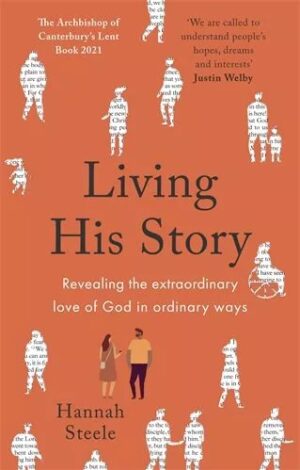



This session explores the story of Jesus and how evangelism is rooted in the resurrection. It aims to encourage you to think about how the first disciples heard and told Jesus’s story and what that means for evangelism today. It also features an interview with Justin Welby, Archbishop of Canterbury.
This session is based around Chapter 1 of Hannah Steele’s book Living His Story. A featured passage is below, but you are encouraged to read the whole chapter as the questions often reference the book.
From Chapter 1 of Living His Story
The gospel of Jesus Christ is a story. It is a story about God that can be told and recited, studied and analysed, debated and discussed. Robert McKee is a lecturer in storytelling who has coached many Hollywood screenwriters and he says this is about our sense of connection with the idea of stories: ‘Our appetite for story is a reflection of the profound human need to grasp the pattern of living, not merely as an intellectual exercise, but within a very personal, emotional experience.’ We show this hunger through the stories that we tell of our lives, often using a narrative to describe how our day has been. When we meet someone for the first time, we tend to get to know them through recounting experiences we have had rather than presenting a list of facts.
The gospel of Jesus Christ is a story, but it is quite unlike any other story we will ever encounter. In fact it is not something that we simply hear and understand but a reality in which we live and find our sense of belonging. His story is the living story that makes sense of all the other stories in our lives.
On the first Easter Sunday morning the women set off for the tomb, taking with them spices that they had prepared for Jesus’ dead body. They thought that Jesus’ story had come to an end. Peering into the tomb these women began to grasp that something in the fundamental structure of the world had changed. Though they did not fully realise this at that moment, they had seen into a world where death was no longer the final frontier, where sin did not get the last word. They glimpsed a new world where resurrection is possible and where death is defeated. To the other disciples this announcement initially sounded unbelievable, so much so that they had to check it out for themselves. What these disciples discovered that first Easter morning was that the Jesus story was far from over; in fact, it was only just beginning.
The gospel is the good news of the risen Jesus. It is the narrative which stands at the centre of human history and upon which the Christian faith is built.
The good news of the risen Jesus is the story we are called to pass on to others. We must be reminded once again of why the good news is really good news for those around us. We need to learn not only to say what Jesus did but to communicate in the way that Jesus did.
As witnesses, one of our roles is to connect this story with the stories of those that we meet. Our job is not to change the story to try and make it fit better with contemporary values. Our role is to help people to see its relevance and significance to them. We do this in a number of ways, through speaking of our own story and talking of the difference that Jesus makes here and now. We do it through connecting the gospel with the stories that shape our cultural landscape, which so often point to the gospel but which we can often fail to see. We do it through listening to others and finding points of connection. We do it through prayer and through living out the story in our character and actions.
For this session, there will be a video interview between Hannah Steele and Archbishop Justin Welby, discussing the Archbishop’s experience with evangelism and storytelling.